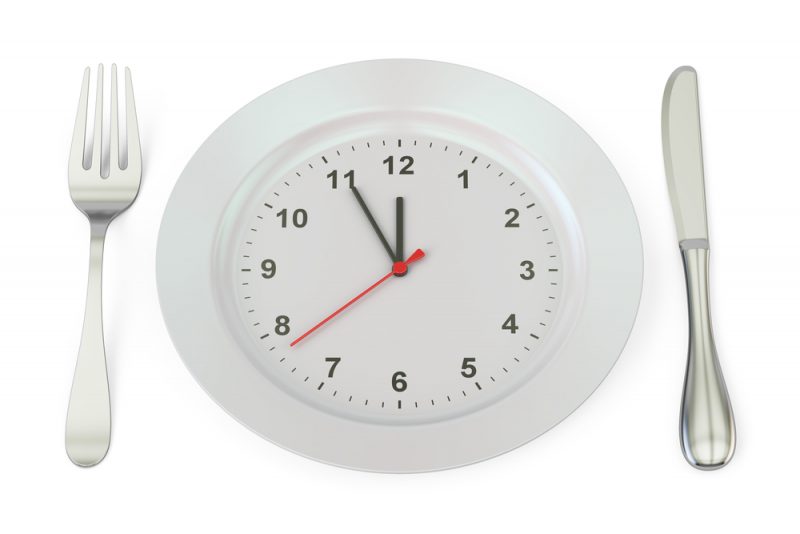Have you been told at some point (even by me) never to skip breakfast? It is THE most important meal of the day.
Were you ever told not to go without food for any length of time, because you will put your body into starvation mode and then when you eat your body will store it as fat and you’ll gain weight?
Or maybe you were told to graze constantly throughout the day.
For some people this is probably good advice, but if you are struggling to lose weight or are noticing a bit of the old ‘middle-aged spread’, maybe it’s a little misguided.
It turns out that the key to long-term weight loss AND healthy ageing, might just be to skip the odd meal or two. Otherwise known as…FASTING (strikes fear into the heart of my food-loving soul)!
Fasting is nothing new. As humans we have evolved to go periods of time without much to eat. It’s only really in the last 50 years have we seen the rise of food manufacturing that enables us to have a 24 hour a day feast. As a result, obesity rates have doubled worldwide since the 1980s!
Some disturbing statistics:
- In 2014, more than 1.9 billion adults, 18 years and older, were overweight. Of these over 600 million were obese.
- 39% of adults aged 18 years and over were overweight in 2014 and 13% were obese.
- Most of the world’s population live in countries where overweight and obesity kills more people than underweight.
- 41 million children under the age of 5 were overweight or obese in 2014.
Does fasting mean then that you have to go days and days without food (perish the thought!)? Thankfully not – there are many ways we can undertake this practice and still have a ‘normal’ life and it’s usually by practicing ‘intermittent fasting’.
Intermittent Fasting:
It turns out that WHEN we eat may be as important as WHAT we eat. Scientists at the Salk Institute for Biological Studies have found that regular eating times and extending the daily fasting period may override the adverse health effects of a high-fat diet and prevent obesity, diabetes and liver disease in mice (hopefully that translates to us humans as well – poor mice).
Benefits:
- Weight loss
- Reduction of IGF-1 (insulin like growth factor), which means that you are reducing your risk of a number of age-related diseases.
- The switching on of countless repair genes in response to this stressor (that is, going without food).
- Giving your pancreas a rest, which will boost the effectiveness of the insulin it produces.
- In response to elevated glucose, increased insulin sensitivity may reduce your risk of obesity, diabetes, heart disease and cognitive decline.
- An overall enhancement in your mood and sense of well-being (having just started – I’m not quite there yet…). This may be a consequence of your brain producing increased levels of neurotropic factor, which will hopefully make you more cheerful and in turn should make fasting more doable. (Source: The Fast Diet. Dr Michael Mosley and Mimi Spencer).
It turns out there is more than one way to incorporate this in your life, all with similar benefits. These are the ones I recommend.
Extended overnight fasting
This is my current favourite and yet not! Breakfast happens to be my most treasured meal of the day – and yet…I have forsaken it in the hope of losing the ‘summer wine’ and starving out some hitchhikers from my years of travel.
Basically, I don’t eat from 8pm – 12pm (although I have been seen in the neighbourhood sneaking a coffee on the odd occasion – old habits die hard!). This means I fast for 16 hours a day and eat only two meals per day. Lunch is now my favourite meal of the day and if you hear my stomach making odd noises from around 10.30am you’ll know why!
I also like this approach because I don’t have to count calories (snooooze). What I’ve found is that I have a really large lunch and then not much at dinner (see bone broth blog). This seems to keep me quite satisfied.
The 5:2 Fast Diet
This is the diet made popular by Dr Michael Mosley on the ABC and SBS.
It involves calorie restriction on two non-consecutive days per week (I recommend Monday and Thursday).
- 500 calories for women
- 600 calories for men
No calorie counting on the ‘off’ days. Huzzah
The pattern recommended as easiest to follow is to eat a normal breakfast and light dinner. Alternatively, two lighter meals with snacks (apple, carrot sticks) in between.
A typical day may look something like this:
500 calorie meal suggestions – calories in brackets
| Day | Breakfast | Dinner |
| 1 | Scant half cup low fat cottage cheese (78)
1 sliced pear (40 calories) 1 fresh fig (24 calories) Total 124 |
Sashimi 3-5 pieces of salmon (180) and tuna (136)
2 tspn. soy sauce (2) Pickled ginger (9) 1 tangerine (25) Total 352 |
| 2 | Oatmeal made with 40gms steel cut oats (160) and water
Scant ½ cup blueberries (30) Total 190 |
Dinner
142 gms chicken breast into strips (148). Stir-fry in 1 tspn olive oil (27) with 1 tspn. ginger (2), 1 tblspn. Fresh coriander (3), 1 clove garlic (3), 2 tspn soy (3) and the juice of half lemon (1) until chicken is light brown. Add water if it sticks. Add ½ cup trimmed snow peas (12), 1.5 cups shredded cabbage (26) and 2 large carrots, peeled and into thin strips (56). Stir-fry for 5-10 mins, until chicken cooked through. Add water if necessary. 1 tangerine (25). Total: 306 |
Source: The Fast Diet. Dr Michael Mosley and Mimi Spencer
Would you like the opportunity to meet Dr MIchael Mosley? Check out our next blog post.
There are of course many other ways to fast, but they all look a bit more difficult to my often recalcitrant brain!
Here’s to ageing well!
Marnie


